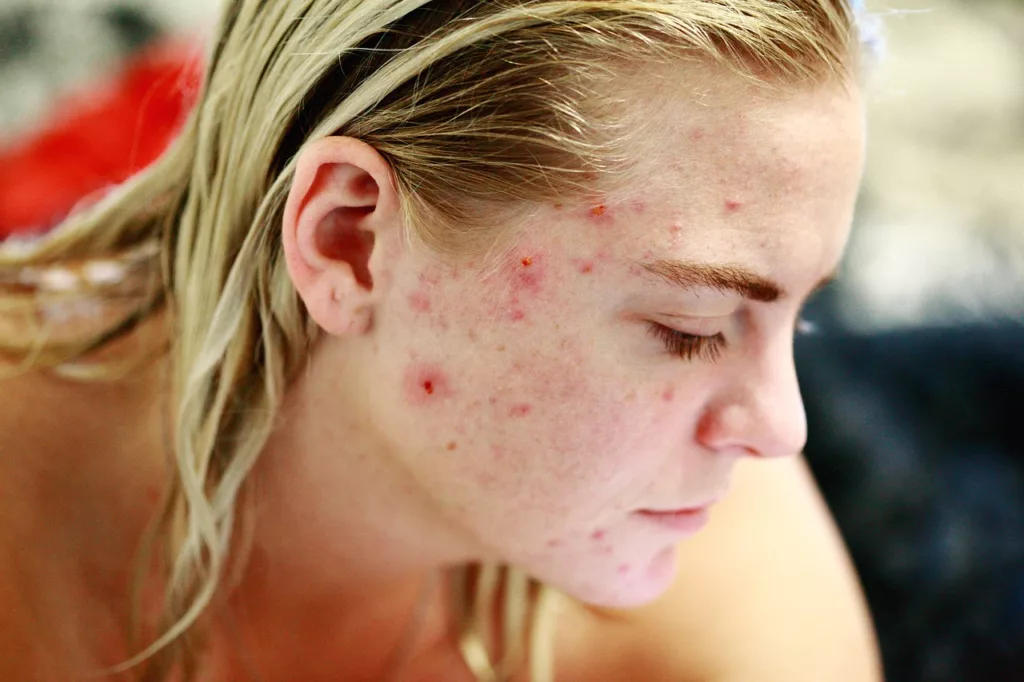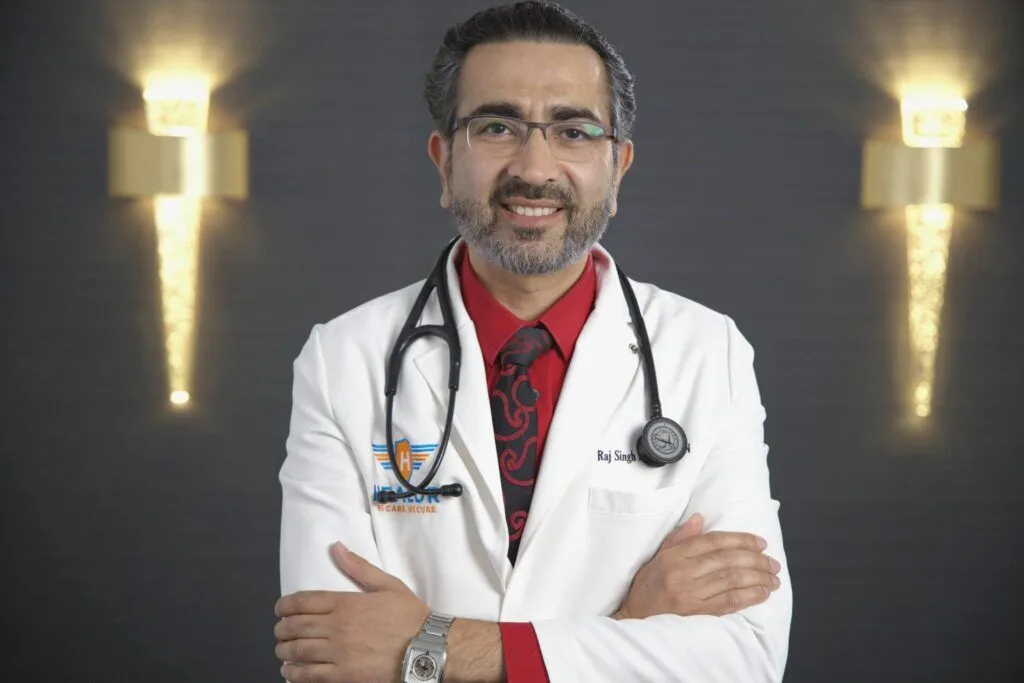
Wondering How Acne Works and How We Can Treat It? Acne is a common skin condition that affects many people. This informative guide explains how acne develops and provides effective treatment options to help you achieve clear skin.
Although Acne might be a common skin condition, but you do not have to live with it forever. An estimated four out of five people between the ages of 12 and 25 have acne. Before someone can get rid of acne, they have to understand how it works. This condition is not caused by simply eating too much chocolate or fast food. Instead, a blend of genetic and environmental factors can cause this condition to happen.
If you believe that you have acne, different options can help. At Healor, you can get bio-identical hormones to correct any hormonal imbalances that might be causing your skin problems. RareV also offers a range of options like acne facials and medications that can help. Through our services, you can find the cause of your acne so that you can choose the best treatment possible.
How Acne Works and How We Can Treat It
Acne is a skin condition that involves the hair follicles and oil glands. There are small holes in your skin that link to oil glands under the skin’s surface. Normally, these glands produce a substance called sebum. Then, a canal brings the oily sebum up to the pores and hair follicles. If there are dead skin cells in the pores, then the sebum will wash it out.
Unfortunately, this process does not always work the way it is supposed to. Instead of leaving the body, the hair, skin cells, and sebum end up clumping together within the pore. This creates a kind of plug that blocks everything from leaving. Bacteria within the plug lead to swelling. Because of all of the bacteria, you may suffer from a great deal of inflammation, swelling, and pain.
A blocked, enlarged pore is known as a comedo. If this plug stays underneath the skin’s surface, dermatologists call it a whitehead. When the plug is at the surface of the skin, it is known as a blackhead. Once the walls of the pore start to break down, the individual has a pustule or pimple. If the oil and bacteria lead to deep cysts, you can even develop scarring from acne. Typically, you will find pimples on your face, back, neck, shoulders, and chest.
There are a number of factors that can lead you to develop acne. Certain kinds of make-up, medications, and cosmetic products can cause acne to happen. Your hormones and genetics can also cause this condition. If you are wearing tight clothing or sporting equipment, the friction can lead to acne. Likewise, environmental factors like humidity and pollution can cause acne to develop. Stress, dirt, and dietary factors do not cause acne.
The right treatment for acne generally involves boosting cellular renewal, reducing oil production, and combating bacteria. This may involve using a gentle, mild cleanser on the skin each day. Over-the-counter medications like salicylic acid and benzoyl peroxide are popular treatment options. Prescription medications like isotretinoin, antibiotics, and oral contraceptives may also work. In some cases, your dermatologist may even recommend cosmetic surgery to get rid of acne scars.
Potential Complications of Acne
There are a variety of different pimples that we can treat. Whiteheads are essentially pimples that are located underneath the surface of your skin. Blackheads come up to the skin’s surface and look black in color.
Meanwhile, pustules are pimples that have pus on the top and redness on the bottom. A papule is a pink, small bump that often feels tender when you touch it. With nodules, you get solid, painful pimples that are large in size and deep underneath the skin’s surface. Finally, cysts are pus-filled pimple located deep underneath the skin that can lead to scarring.
The most common complication of acne is scarring. Thankfully, you can prevent this from happening by making sure to get your acne treatment as early as possible. You should also avoid picking at any of your pimples.
While any kind of acne can cause scarring, acne scars are more common when you have cysts or nodules. When these spots burst, they cause damage to the nearby skin. The three forms of acne-related scars are ice-pick scars, rolling scars, and boxcar scars. While boxcar scars are oval or round craters in the skin, ice-pick scars are deep, small holes in the skin’s surface. These holes make your skin look like it has been punctured by a needle or small knife. Rolling scars are made when bands of scar tissue form beneath the skin’s surface. This causes the skin to have an uneven, rolling appearance.
Treatment Options for Acne
Discovering the right acne treatment can be difficult. There are countless products available at the stores, and only some of these products will actually work. Should you use acne washes? Would a spot treatment work better? What about an acne facial?
At places like RareV, you can figure out the best treatment option. We offer microdermabrasion, dermal fillers, European facials, laser treatments, and other services to help you get the skin you deserve. Through the right care, you can figure out the underlying cause of your acne, the type of acne, and the best treatment for it.
Each person requires a different treatment plan. In some cases, your symptoms may even get worse before they get better. At your initial consultation, your dermatologist will determine how severe your acne is and give it a grade. While grade 1 is for the mildest forms of acne, grade 4 is for the most severe types of acne. Then, your skin care specialist will decide if you need oral medications, topical treatments, or both.
Oral acne treatments are medications that you take on a daily basis. They help if you have acne cysts, swollen pimples, or nodules. Your doctor may give you birth control pills to balance your hormones or antibiotics to kill bacteria. Isotretinoin is another popular medication for treating acne.
Topical treatments
Topical Treatments are the most popular form of care for acne. They can work through several different mechanisms. Some topical creams reduce the amount of oil on your skin. Other creams kill the bacteria that cause acne to form. For severe acne, your doctor may recommend a cortisone shot, dapsone gel, spironolactone, or azelaic acid.
Birth Control Medication
One of the ways you can reduce your acne is through contraceptives. This is generally a good option if you see acne around your period each month. When this happens, it is a sign your acne is caused by hormonal changes. Androgens like testosterone actually make the skin produce more sebum, which can end up clogging your pores. By taking birth control medication, you can balance your hormones and prevent acne from forming.
Salicylic Acid
Salicylic acid is another popular medication for acne. It includes anti-inflammatory properties that help to reduce inflammation and redness. This type of beta-hydroxy acid (BHA) works by dissolving the excess oil on your skin’s surface. Its active ingredients also help it exfoliate dead skin cells so that they cannot block your pores. Salicylic acid may be included in a face wash, spot treatment, toner, or moisturizer. Avoid using too much of this acid at any given time because it can dry out the skin. This acid is also a powerful chemical for blackhead removal as well.
Benzoyl Peroxide
This treatment is known for its antibacterial qualities, which is why you often find it in an acne facial. This ingredient works to kill the bacteria that lead to breakouts. Be careful about using it as a leave-on cream because it can bleach your clothes and dry out your skin. Instead, use a formulation that only includes a maximum of 2 percent of benzoyl peroxide.
Isotretinoin
Known for being a strong retinoid, this ingredient is typically given to someone who has extremely severe acne. If nothing else seems to work for you, isotretinoin might be the best choice. Most people know this chemical under the brand name Accutane. It can help with body acne in men and cystic acne in women. In general, patients need to take it for about six to nine months to be cured of their acne completely.
Spironolactone
If birth control pills are not the right option for you, an androgen blocker like spironolactone may be the right choice. This medication works to reduce the amount of androgen hormones that actually circulate within your body. It does this by blocking the receptors that normally bind with testosterone. When you use these pills with an oral contraceptive as well, it can greatly reduce the severity and incidence of your acne breakouts. This treatment is also an excellent choice for women who suffer from polycystic ovarian syndrome (PCOS).
Retinol
Most people know that retinoid creams can help reduce the signs of aging, but they can actually help with acne as well. Retinoids make the skin cells renew at a faster rate. These creams help boost exfoliation and reduce oil production. Since acne involves inflammation, the anti-inflammatory properties of retinoids are also useful. Prescription retinoids are useful for severe cases of acne. Keep in mind that you will generally need to take this treatment for a few weeks or months before it delivers results, so you will need to use it more than just once or twice.
Dapsone Gel
This is a prescription option for treating acne. Sold under the brand name of Aczone, dapsone includes anti-inflammatory and antimicrobial properties. It helps with blackhead removal and deep, painful pimples. It can also work to get rid of your whiteheads as well.
Cortisone Shots
Cortisone shots are not useful for day-to-day treatments or ongoing care. Instead, cortisone works for emergencies like an upcoming wedding or a major presentation at work. A shot of cortisone can cause your acne to disappear within 24 to 48 hours. This treatment can do wonders for hormonal flare-ups, cystic breakouts, and inflammation. You should always go to a professional treatment center like RareV because cortisone shots can leave a small depression on your skin if the clinicians do not know what they are doing.
From handling acne scars to eliminating a breakout, the right spa can do wonders for your skin. At RareV, we have years of experience in helping patients treat acne, cysts, and other skin problems.

